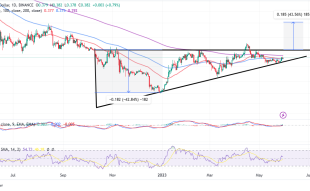Join Our Telegram channel to stay up to date on breaking news coverage
Over the weekend, around 200 influential individuals from the crypto, pharmaceutical, political, and academic sectors completed their two-month stay in Zuzalu. Zuzalu was an experimental “pop-up” community conceptualized by Vitalik Buterin, co-founder of Ethereum. The community was named “Up City Community.”
Starting in March, a group called Zuzalans embarked on a unique journey. They temporarily put aside their regular lives and identities to become the first citizens of a new civilization. Their temporary home was a resort hotel and Airbnb in Lustica Bay, Montenegro. Their primary task was to imagine and shape a new future that they believed would benefit humanity.
During Zuzalu, the participants talked about cryptocurrency, blockchain networks, and AI, which are currently popular topics in tech. In addition to discussing human longevity, they discussed a “network state” introduced by Balaji Srinivasan, the former Coinbase CTO.
Is That What it Was Really Like?
“Every single person here believes they can change the world,” Decrypt received a statement from Hannah Hamilton, one of the co-founders of the decentralized finance protocol called Asymmetry. “Usually, you meet one person who believes they can change the world – but it’s everyone.”
During Hamilton’s second night at Zuzalu, a man at an apartment party approaches her and asks if she believes she has the power to alter the course of human history. This conversation is common among Zuzalans and serves as a lighthearted icebreaker. Another popular question asked at conferences is about the age at which someone expects to pass away, with answers varying from 80 years old to “never.”
At first, Hamilton laughed, telling him she couldn’t change the world alone. That’s apparently not the case.
Hamilton responded to the man by saying, “You already are.” According to him, Hamilton’s finance protocol is making a significant impact on Ethereum, which, in turn, is shaping the global economy and decentralized information network. As a result, Hamilton now firmly believes that she can directly influence the future of humanity.
“Within days,” she said, “Zuzalu changed my life.”
At Zuzalu, life was decentralized, with spontaneous interactions between participants fostering collaboration and conversations.
The conference had two main social hubs for the Zuzlan community: breakfast, which consisted of vegetarian meals served at a local Montenegrin restaurant, and the sauna located at Chedi Lustica Bay, a luxurious five-star hotel that served as the temporary residence for most of the Zuzlans.
At one point, the sauna at Chedi Hotel became the venue for a series of philosophical discussions organized by the Zuzlans called “Sauna Philosophers.” Over 30 people attended these conversations regularly. However, due to the large number of participants and its impact on the hotel, the management of Chedi Hotel requested the immediate closure of the sauna.
Bitcoin Startup Ordinals is Attracting Former Ethereum Developers
At Zuzalu, where events were generally informal, any moment, even a house party, could be an opportunity for personal growth. Zuzalans brought many bolivars, the highly inflated currency from Venezuela, to Montenegro. They distributed these seemingly worthless bills as unique and secure invitations to the party.
Some people found this action amusing and thought it was pointless. The party turned away anyone without bolivars later that night. Anyone bringing a guest without a bill had to pay for their entry. Bolivar bills became essential for attending the party and were no longer considered worthless.
Bolivars quickly became highly sought after among Zuzalavians, but their value soon dropped. To get authenticated virtual IDs, bolivar holders enter their serial numbers into an app. With these IDs, you could establish trust among growing social circles.
Despite some exclusive practices to foster trust, Zuzalu was generally described as open and welcoming by attendees who spoke with Decrypt. In a small community like Zuzalu, like-minded individuals naturally gravitated toward each other.
One group that gained attention in Lustica Bay consisted of Zuzalans, who believed in achieving immortality. They developed a reputation for entrepreneurial confidence in challenging humanity’s greatest limitation: mortality, during their time at Zuzalu’s Balkan campus.
“It’s one of those people who think they’re not going to die,” Hamilton shared that he and his friends would whisper on Lustica’s streets when such Zuzalan were gone.
However, in Zuzalu, many individuals believe that conquering death is the next phase of human progress. Yet, this advancement may introduce its own set of challenges.
Join Our Telegram channel to stay up to date on breaking news coverage


